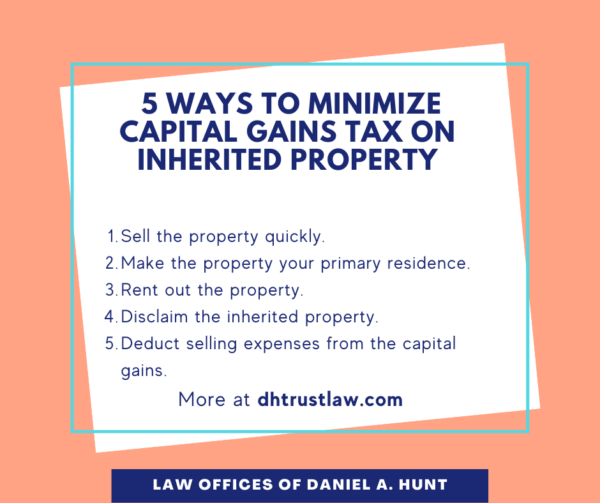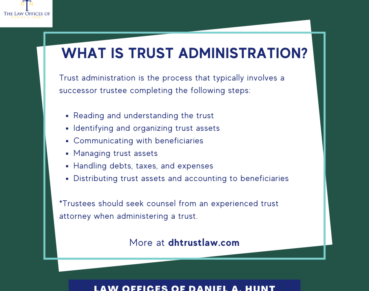Avoid Capital Gains Tax on Inherited Property

In California, real property is one of the most valuable assets you can inherit from a loved one. But inheriting real estate that has increased in value over time can trigger capital gains tax consequences when you sell that piece of property. If you’re concerned about the tax consequences, here’s how to avoid paying capital gains tax on inherited property.
What is a Step-Up in Basis?
When you sell real estate, if the sale price exceeds the price you originally paid for the home, you would owe capital gains tax on the difference. When you’re an heir receiving a piece of property you inherited, the IRS may qualify the property for a “step-up in basis” when it comes to tax liability.
The step-up in basis means that the IRS will use the property’s fair market value as of the date of the Trustor’s death instead of the original purchase price when calculating capital gains when the inherited property is sold.
For example: Let’s say your parents bought a home in the 1960s for $30,000 and by the time they pass away, that home has appreciated in value and is now worth $430,000. Usually, you would owe capital gains tax on the $400,000 difference between what your parents paid for the home and its current value. This imposes major tax consequences on anyone who inherits real property, which is why the IRS allows you to use a stepped-up basis.
Imagine that you keep the real property for a few years and then sell it for $480,000. If the stepped-up basis value when you inherited the property was $430,000, you would only owe capital gains tax on the $50,000 difference. The step-up in basis provides a major advantage to heirs when it comes to reducing capital gains tax.
How to Avoid Paying Capital Gains Tax on Inheritance
Many heirs would like to reduce or eliminate their capital gains tax liability if possible. Here are five ways to avoid paying capital gains tax on inherited property.
1. Sell the inherited property quickly.
The first option to minimize or eliminate capital gains tax on inherited property is to sell it right away. If you inherit a property valued at $500,000 and immediately sell it for $500,000, then you have no capital gain.
If the home value goes down and you sell the property for less than the value at which you inherited it, then you would also not incur any capital gains tax.
The IRS considers inherited property to be long-term capital gain. The tax rate would be 0%, 15%, or 20%, depending on your income bracket.
2. Make the inherited property your primary residence.
Another option to avoid paying capital gains tax on an inherited property is to use it as your primary residence. The Section 121 Exclusion allows a taxpayer to exclude up to $250,000 (or $500,000 on joint returns) of the capital gain from the sale if they live in the property for at least two of the five years before the sale.
However, if you sold another primary residence within the two years prior to selling the inherited home turned primary residence, you generally won’t be eligible for this exclusion.
3. Rent the inherited property.
If you want to keep the home but don’t plan to live in it right away, you may decide to turn the property into a rental. If you later decide to sell the home, you could choose to defer paying taxes by conducting a 1031 tax-deferred exchange. A 1031 exchange occurs when you sell one investment property and purchase another with the proceeds.
If you do not wish to purchase another rental property with the proceeds, then you will be assessed for capital gains tax when you sell the rental property.
4. Disclaim the inherited property.
One final option to avoid capital gains tax on inherited real estate is to disclaim the inheritance. To disclaim an inherited property, you would sign a Disclaimer with your attorney and voluntarily choose not to inherit that property to avoid negative tax consequences, such as being placed in a higher tax bracket.
If you choose to disclaim an inherited property for tax purposes, that asset would go to the next person in line to inherit. Keep in mind that this decision is final and you cannot change your mind later.
5. Deduct selling expenses from capital gains.
One final way to reduce your capital gains tax liability is to subtract any expenses incurred from preparing the house for sale or closing costs. For example, if you sell the home for $400,000 and its fair market value on the date of your inheritance was $350,000, you have $50,000 in capital gains. But you can reduce this exposure by subtracting the closing costs of $40,000, leaving you with only $10,000 in capital gains.
An experienced estate planning attorney and CPA can help you find an ideal strategy to reduce or avoid taxes after inheriting real estate. If you have any questions about how to avoid paying capital gains tax on inherited property, feel free to contact our law firm.
Law Offices of Daniel A. Hunt
The Law Offices of Daniel A. Hunt is a California law firm specializing in Estate Planning; Trust Administration & Litigation; Probate; and Conservatorships. We've helped over 10,000 clients find peace of mind. We serve clients throughout the greater Sacramento region and the state of California.




